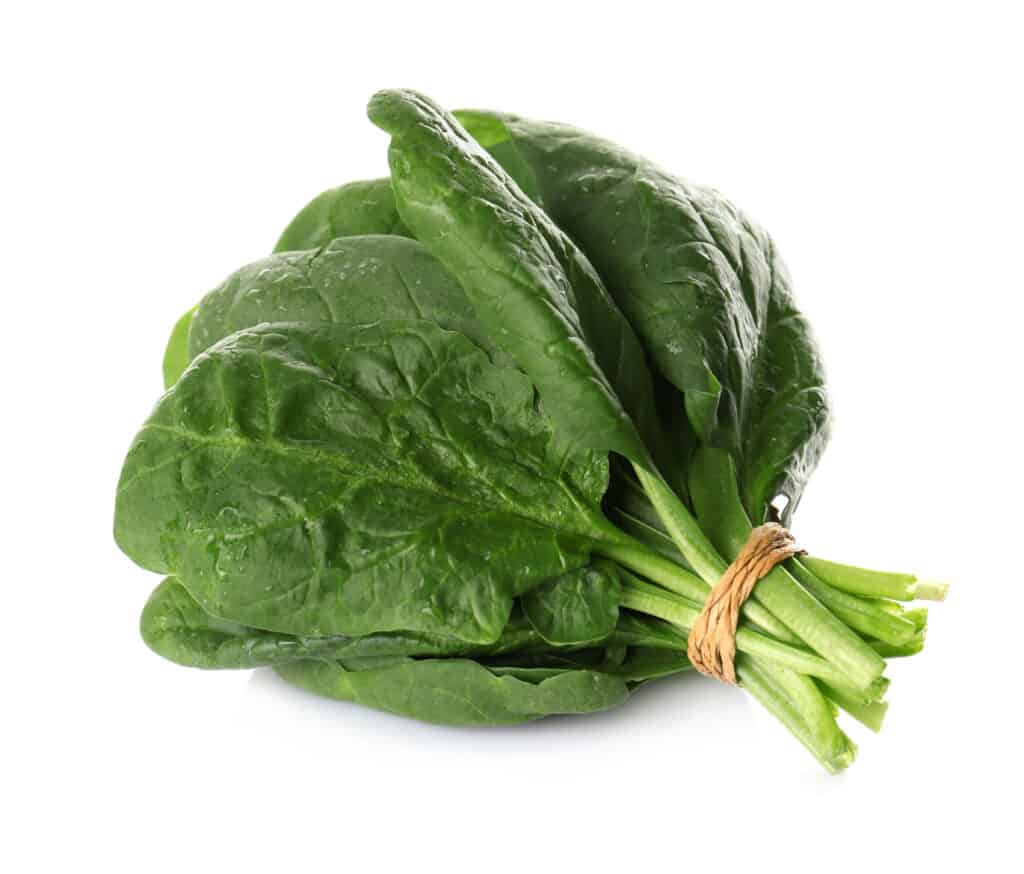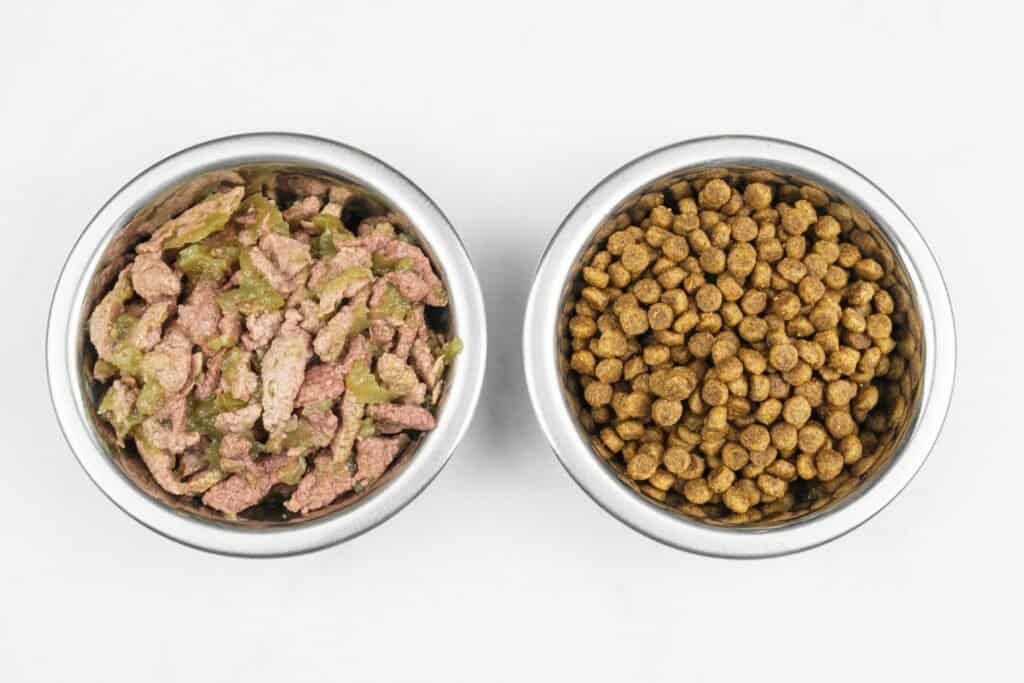There are two sides to the story when it comes to feeding your dog spinach. Some say it is safe for your dog, while others say it may cause kidney damage.
Dogs can eat some crunchy vegetables, like cabbages. In fact, in the right amounts, it is healthy for them.
Your experience with spinach and dogs relies on several factors. For example, cooked spinach is much less harmful than raw spinach. How much spinach can a dog eat, and what is the best way to prepare spinach for a dog? Let’s find out.
What Is Spinach Good For?
Spinach is a good source of vitamins A, B, C, and K.
Vegetables are generally high in vitamins, suitable for a healthy dentition, shiny coats, and a protected immune system.
The high fiber content of spinach also makes it an excellent nutritional source for dogs with diet issues. You may consider a spinach diet if your dog is trying to maintain its weight or if you prefer a low-calorie diet for the dog. It will make your pup feel full without adding excess weight.
It is a handy ingredient to keep around, especially if you make homemade meals for your dog.

Spinach has fiber, which is very healthy for dogs and will make them feel full for longer without adding excess calories.
©New Africa/Shutterstock.com
Health Benefits of Spinach For Dogs
Vitamin A
Vitamin A is an essential vitamin for dogs. Your dog needs vitamin A for sharp vision, especially at night. Puppies and growing dogs need vitamin A more because it helps in cell differentiation, bone growth, and immunity.
Your dog needs at least 3,333IU per kg of dry matter diet to stay healthy. It is almost impossible to overdose on vitamin A, and this vitamin’s toxicity is rare. Nonetheless, don’t let your pup chew a whole bottle of vitamin A.
Vitamin B
Vitamin B is great for your dog’s heart. A healthy vitamin B dose boosts heart health and circulation and makes your pup’s coat shiny and strong. It is also a great immune booster; it keeps ticks and fleas away.
A vitamin B source like spinach will improve metabolism and digestive health. As with Vitamin A, you need not worry about overdosing on vitamins. Dogs don’t store up vitamins. They simply take what they need and excrete the rest.
Vitamin C
Vitamin C is an anti-aging vitamin for dogs. Dogs do not only age outwardly; their organs and bones get tired too. Vitamin C sweeps up free radicals that encourage aging, helping your favorite wet nose stay active for longer.
Vitamin K
Dogs need vitamin K for blood clotting, just like humans. Vitamin K ensures that tiny bruises heal quickly and old wounds do not reopen. Vitamin K also contributes to healthy bones and teeth by directing calcium storage into them.
Iron
Iron is essential for blood formation. If your dog is always tired and passes dark-colored stools, it may indicate iron deficiency. You should try adding spinach to their diet. Iron transports oxygen in the blood. If your pup is short of iron, it may begin to breathe much faster than usual, as if it can’t get enough oxygen.
Beta-carotene
Beta-carotene is quite similar to Vitamin A. it is necessary for good night vision. It is a pigment-enriching vitamin that elevates your dog’s coat, especially for breeds with red or brown coats.
Vitamin deficiency in dogs typically causes lethargy, excessive thirst, drooling, joint disease, and weight loss.
What Happens When I Feed My Dog Too Much Spinach?
However, spinach is not ALWAYS safe. Raw spinach is difficult to digest, and this may cause intestinal blockage, bloating, and discomfort. If you think your canine is suffering from blockage after eating spinach, you should call your vet and confirm if it is safe to induce vomiting.
Spinach plays the role of an add-on to your dog’s nutritional needs. It is not the main course, just a side attraction. You only need about three tablespoons of spinach to achieve the recommended daily dose of vitamins and fiber.
Feeding your dog spinach every day can lead to kidney problems. The vegetable contains high amounts of oxalic acid. When your dog overeats spinach at once or eats even a moderate amount daily, oxalic acid builds up. The acid binds with calcium and magnesium, forming waste products that the kidney excretes. The more oxalates present, the more cleaning up your pup’s kidneys have to do.
High doses of spinach will lower metabolic calcium and magnesium levels, making your four-legged friend nutrient-deficient.
How Much Spinach Can My Dog Tolerate?
The correct answer depends on your dog’s weight and the number of other vegetables in your dog’s meals. For starters, one to three tablespoons of spinach should do. Even so, consider the frequency of feeding. If you plan to feed your dog spinach daily, stick to the lower limits. Constantly monitor your dog’s bowel movements when you make any changes to its diet.
Your dog will need to consume its weight in spinach to feel any prominent side effects.
But, if your dog has had any trouble with his kidneys in the past, avoid feeding it spinach. If you must, start with a once-in-a-week spinach routine.
How Do I Make My Dog Enjoy Spinach Treats?
Raw spinach is bad for dogs, but cooking it removes all the necessary nutrients. The solution is to steam the vegetable for no more than three minutes. Cooked spinach is a poor source of nutrients, but a great source of fiber.
Don’t season your spinach (or any dog food) with salt, onions, or garlic. Sprinkle this on your dog’s favorite dish, and you have yourself a healthy treat your pup can’t say no to.
Even if your dog prefers dry food, you aren’t left out! You can try out a simple vegetable biscuit recipe. It’s simple, just make a puree out of all the fruits and vegs your dog needs and loves, then fold them into some dough and bake until crisp. Now you can reward your dog with delicious, healthy treats.

You can sprinkle on or mix spinach into your dog’s favorite wet or dry food.
©Galina-Photo/Shutterstock.com
How Do I Know If My Dog Has Had Too Much Spinach?
It may take a while for calcium oxalate levels to become high enough to cause any real damage. Nonetheless, we’ll not wait for it to happen before we monitor our pet’s spinach intake. These signs indicate that your dog’s diet contains too much spinach (or other vegetables)
- Flatulence: excessive gassing
- Diarrhea
- Vomiting
- Copious feces: your pet’s feces have increased significantly
- Hard stools
- Bloatedness
If your dog overeats spinach, there is no need to induce vomiting. The condition most likely isn’t lethal. Instead, make changes to their diet. If you still feel uncomfortable, speak to your vet.
What Are Other Vegetables Safe For Dogs?
There are a handful of vegetables that dogs love. Using vegetables as treats instead of dog bites can save you money and help your dog maintain a healthy weight. However, while feeding your dogs vegetables, you must watch out for the ingredients safety. Make sure each vegetable is fresh, clean, and organically grown. Dogs don’t do too well with preservatives and pesticides. Your pet is bound to enjoy these vegetables.
- Carrots: they are fun and sweet, and dogs love them. Cut off the ends of the carrot, then dice it up before serving.
- Cucumbers are juicy and healthy for dogs of all ages and sizes. You may pick the seeds before offering the slices to your dog, but it is also perfectly safe to let them eat them.
- Celery: adding celery to your dog’s diet keep it super hydrated. It is also high in fiber.
Too many vegetables may cause diarrhea. Your dog’s overall diet should contain less than 25% vegetables. Here are the 5 Healthiest Vegetables Dogs Can Eat and 3 to Avoid.
Up Next
Yes, Dogs can Eat Cabbage. Here’s Why.
The photo featured at the top of this post is © sompong.j5d/Shutterstock.com
Ready to discover the top 10 cutest dog breeds in the entire world?
How about the fastest dogs, the largest dogs and those that are -- quite frankly -- just the kindest dogs on the planet? Each day, AZ Animals sends out lists just like this to our thousands of email subscribers. And the best part? It's FREE. Join today by entering your email below.
FAQs (Frequently Asked Questions)
What is the best vegetable for dogs?
The best vegetable for your dogs depends on their palate! Most dogs love carrots, green beans, and peas. Your dog might too.
What vegetables can a dog not eat?
Onions, chives, and garlic belong to a class called Allium. They are toxic to dogs, as well as cats.
Are potatoes suitable for dogs?
Yes, as long as they are adequately cooked and unseasoned.
Is watermelon good for dogs?
Watermelon seeds may cause indigestion, and taking them out may be a bother. Nonetheless, dogs can eat watermelons. To be safe, chop the fruit into bits and fish out all the seeds.
Thank you for reading! Have some feedback for us? Contact the AZ Animals editorial team.







